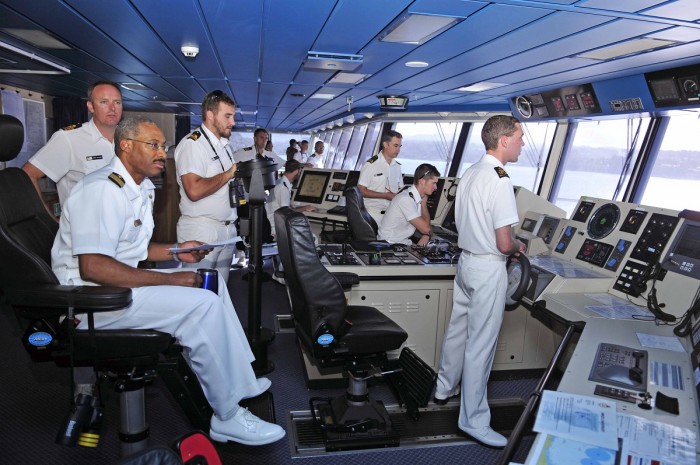Navy Officer
Āpiha Tauā Moana
Navy officers train navy sailors, manage field exercises and lead sailors in combat, peacekeeping missions, border patrols and disaster relief.
Pay
Navy officer cadets usually earn
$51K per year
Lieutenant commanders can earn
$101K-$133K per year
Source: NZ Defence Force, 2023.
Job opportunities
Pay
Pay for Navy officers varies depending on specialist trade, experience and rank.
- Officer cadets (midshipmen) usually earn $51,000.
- Ensigns usually earn between $70,000 and $84,000..
- Sub-lieutenants usually earn between $78,000 and $98,,000.
- Lieutenants usually earn between $89,000 and $117,000.
- Lieutenant commanders can earn between $101,000 and $133,000.
Navy officers may also get food and accommodation allowances, free medical and dental care.
Source: New Zealand Defence Force, 2023
(This information is a guide only. Find out more about the sources of our pay information)
What you will do
Navy officers may do some or all of the following:
- organise and conduct training
- instruct and lead sailors during training exercises and on deployment
- budget, and manage resources assigned to them
- operate and maintain Navy equipment
- conduct maritime security operations and border patrols
- help in search and rescue operations and disaster relief efforts in New Zealand and overseas
- train sailors in fitness, first aid and combat.
Navy officers also have duties related to their area of specialisation. For example, warfare officers command and control warships, navigate and ensure safe passage of the ship at sea.
Skills and knowledge
Navy officers need to have:
- leadership, management and budgeting skills
- knowledge of Navy regulations, tactics and protocol, including health and safety, ethics, and conduct
- knowledge of drills and parade requirements
- knowledge of how to operate and maintain weapons and radio equipment
- problem solving skills
- first aid and rescue skills.
Navy officers also need to have skills and knowledge related to their field of specialisation or trade. For instance, navy warfare officers need to know how to operate various weapons systems.
Working conditions
Navy officers:
- usually work regular business hours but may be expected to work long or irregular hours on training exercises or when on deployment
- work and train on Navy ships in New Zealand and overseas
- work in all weather conditions and may have to work in combat situations
- may spend long periods away from home on overseas assignments.
Entry requirements
To be eligible for navy officer basic training you need to:
- be at least 17 years old to apply (18 years old at the completion of basic training)
- have no criminal convictions
- have a minimum of NCEA Level 2 with 12 credits in English
- hold a current and clean driver's licence
- be medically and physically fit
- be a New Zealand citizen, or a New Zealand residence class visa holder.
If you meet the criteria, you also need to:
- pass aptitude and fitness tests
- attend a formal interview for your selected trade (area of specialisation)
- attend and pass a selection board.
Some trades differ in their age requirements, and may require you to have NCEA credits in specific subjects or a tertiary degree.
On-the-job training
New officer cadets (midshipmen) are posted to Devonport Naval Base to complete 24 weeks of Junior Officer Common Training (JOCT).
Secondary education
NCEA Level 2 with a minimum of 12 credits in English is required for this job. Useful subjects include science, technology, english, mathematics, and physical education.
Personal requirements
Navy officers need to be:
- disciplined and organised
- confident
- careful and accurate, with an eye for detail
- efficient and able to work well under pressure
- able to manage and lead people
- able to solve problems and make decisions
- able to give instructions well.
As well as the ability to command and show leadership, you have to be able to motivate your team.

Vicki Rendall
Navy Officer
Useful experience
Useful experience for navy officers includes:
- training as a sailor in the Navy
- being a member of the Naval Volunteer Reserve
- involvement in youth organisations such as Sea Scouts and Cadets
- experience at sea
- work, sporting or other team environments
- tertiary education, or experience of activities requiring self-discipline and responsibility.
Physical requirements
Navy officers must pass Navy fitness tests, so they need to be fit, healthy and strong, with good hearing and eyesight (with or without corrective lenses). Some positions require you to have normal colour perception.
Find out more about training
- Defence Careers
- 0800 136 723 - www.defencecareers.mil.nz
What are the chances of getting a job?
Chances of getting a job as a navy officer are average as the Navy recruits only a small number of officers each year, and competition for positions is high.
The New Zealand Navy is made up of around 2651 staff.
Diversity of staff important
The Navy is committed to diversity, and wants to increase the number of women and have more of a mix of cultures. Women typically make up about 22% of Navy staff.
Chances good for some specialist roles
Your chances of being accepted into basic navy officer training are better if you apply for the following trades:
- warfare officer
- marine and weapon engineer.
Defence Force only employer
Navy officers work for the New Zealand Defence Force in New Zealand and overseas.
Sources
- Bonallack, A, 'How do you Choose your Speciality? It all Starts with Defence Recruitment', May 2017, (www.navy.mil.nz).
- New Zealand Defence Force, 'Defence White Paper 2016', June 2016, (www.defencecareers.mil.nz).
- New Zealand Defence Force, 'Future35 Our Strategy to 2035', accessed July 2017, (www.nzdf.mil.nz).
- New Zealand Defence Force, 'New Zealand Government Defence Capability Plan 2016', (www.nzdf.mil.nz).
- New Zealand Defence Force, 'The 2015-2016 Annual Report', accessed July 2017, (www.nzdf.mil.nz).
- New Zealand Herald, 'Navy's Newest Vessels haven't Left Port for Years', 14 April 2016, (www.nzherald.co.nz).
- Patterson, J, 'NZ Defence Force to get $20bn Upgrade', 8 June 2016, (www.radio.co.nz).
(This information is a guide only. Find out more about the sources of our job opportunities information)
Progression and specialisations
Navy officers may progress in rank to:
- ensign
- sub-lieutenant
- lieutenant
- lieutenant commander and commander
- captain
- commodore
- Real admiral and vice admiral (chief of defence force).
Navy officers may specialise in:
- warfare
- marine and weapon egineering
- aviation
- mine clearance and diving
- Defence Careers website - information on Navy jobs
- Royal New Zealand Navy website - information on Navy ranks
Last updated 28 August 2023


